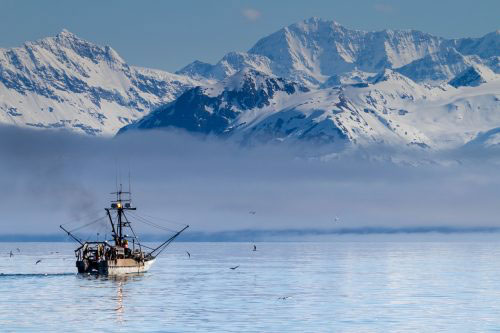
Alaska fishermen are becoming more specializedBy LAUREN FRISCH
April 29, 2019
A team of researchers led by University of Alaska Fairbanks College of Fisheries and Ocean Sciences professor Anne Beaudreau synthesized 30 years of income and catch data from individual commercial fishermen in Alaska. Beaudreau’s team found that the overall number of permit holders in Alaska decreased by 25 percent from the early 1990s to 2014. In addition, the number of fishermen with multiple fishing permits declined from 30 percent of permit holders in 1988 to 20 percent in 2014.
“Diverse fishing portfolios can buffer against risk, akin to a diverse financial portfolio,” said Beaudreau. “As Alaska fisheries become more specialized, how resilient will fishing communities be to future change?” Several previous studies of Alaska fisheries have found that individuals, vessels and communities with broader access to more species or permit types tend to have more stable incomes due to diversification. Despite the potential benefits of diversification, Beaudreau’s team found, Alaska fishermen have become more specialized in their fishing strategies, rather than more diverse, during the past 30 years. This reduced diversity may be caused by a number of barriers, including a limit to the number of fishing permits allowed for many fisheries. For example, current fisheries for halibut and sablefish have an individual quota system, where new fishers may enter the fishery, but only if they’re able to buy quota from another fisher selling shares. Additional barriers to diversification may be socioeconomic. Many Alaska fisheries have seen permit prices and equipment costs skyrocket since the 1970s, so that it may not be feasible for some fishermen to participate in multiple fisheries. Examining several case studies, Beaudreau’s team was interested in how fishery participation and fishing portfolio diversity responded to different types of shocks, including biomass declines, changes to management, fluctuations in prices and the Exxon Valdez oil spill. The authors were part of a working group through the National Center for Ecological Analysis and Synthesis, which was funded by the Exxon Valdez Oil Spill Trustee Council, Prince William Sound Herring Research and Monitoring Program, and Gulf Watch Alaska. Beaudreau explained that salmon have become an increasingly important part of fishing portfolios across the state. “Across the many management and environmental changes that have occurred since the 1970s, while we’ve seen fishers become less diverse in the permits they hold, many continue to participate and specialize in salmon fisheries,” she said. Future research is needed to understand what programs or fishery management approaches can be developed to help fishers maintain flexibility, opportunity and choice in their fishing strategies.
|
|||||
